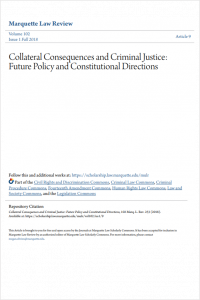Collateral Consequences and Criminal Justice: Future Policy and Constitutional Directions
Gabriel J. Chin, 102 Marquette Law Review 233
According to the article's author, national policy with respect to collateral consequences is receiving more attention than it has in decades. This article outlines and explains some of the reasons for the new focus. The legal system is beginning to recognize that for many people convicted of crime, the greatest effect is not imprisonment, but being marked as a criminal and subjected to legal disabilities.
Consequences can include loss of civil rights, loss of public benefits, and ineligibility for employment, licenses, and permits. The United States, the 50 states, and their agencies and subdivisions impose collateral consequences—often applicable for life—based on convictions from any jurisdiction. However, because they were deemed “civil,” collateral consequences have been created and imposed with few constitutional limitations.
